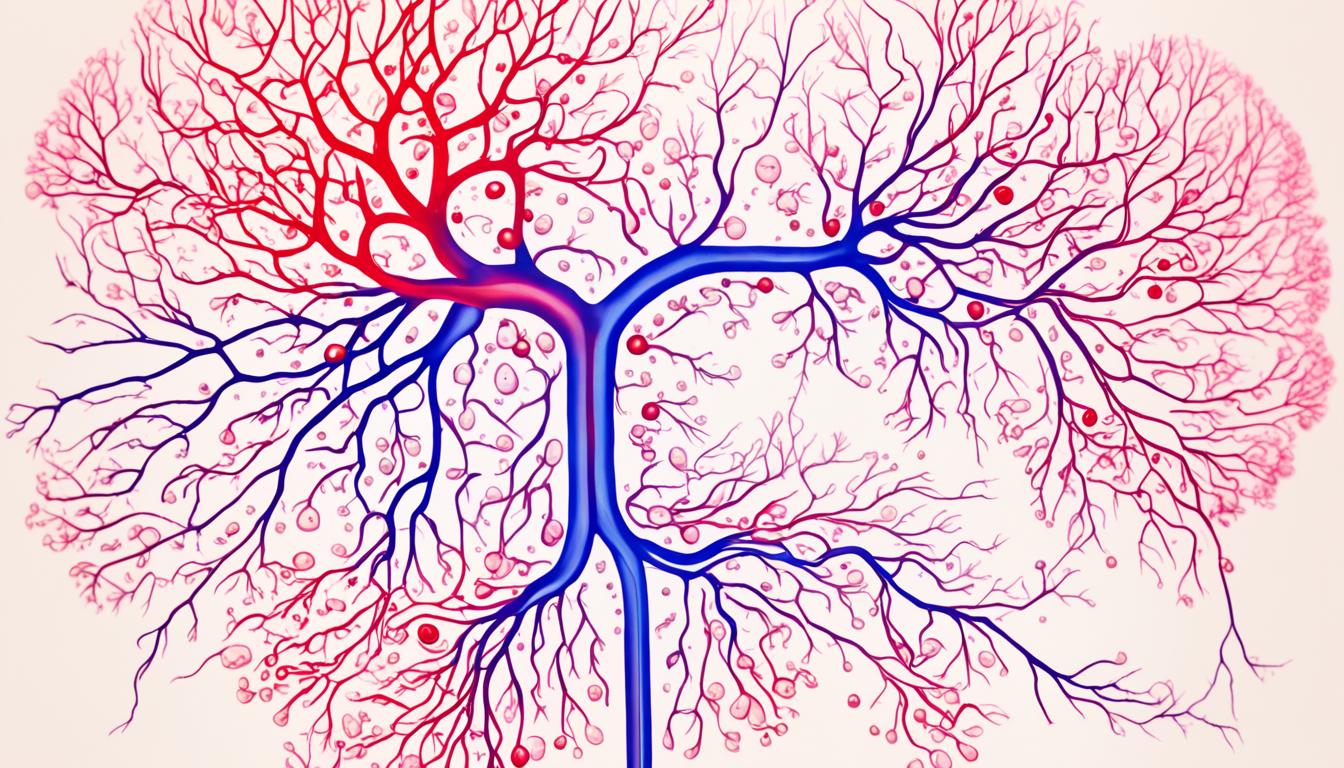A blocked ureter, known as ureteral obstruction, is a serious condition. It can hurt your kidney’s ability to work and lead to health problems. In this article, we’ll talk about the signs, reasons, and ways to figure out if someone has a blocked ureter. We’ll also look at how stem cell therapy in Thailand is a new and promising way to treat it.
Key Takeaways:
- Blocked ureter, also referred to as ureteral obstruction, can cause significant kidney damage if left untreated.
- Symptoms of a blocked ureter may include abdominal pain, urinary changes, and blood in the urine.
- Common causes of ureter blockage include urinary tract stones, ureteral strictures, and external compression from tumors.
- Diagnostic procedures such as ultrasound, computed tomography, and intravenous urography can help identify and evaluate the obstruction.
- Treatment options for blocked ureter range from surgical interventions to less invasive techniques such as ureteral stenting.
- Stem cell therapy is an advanced and promising treatment option for blocked ureter, offering potential benefits in restoring kidney function.
- Thailand provides cutting-edge stem cell therapy treatments for individuals seeking innovative solutions for their urologic disorders.
What is a Blocked Ureter? Understanding Hydronephrosis
A blocked ureter can lead to hydronephrosis. This happens when something blocks urine from moving from the kidneys to the bladder. The obstruction makes the renal calyces and ureters swell above the blockage spot.
Hydronephrosis is serious because it can hurt kidney function and damage kidney cells. If it’s not treated, the kidneys could be permanently harmed.
How does a Blocked Ureter Lead to Hydronephrosis?
A blockage in a ureter stops urine from flowing normally. This might happen because of kidney stones, tumors, or other barriers. As a result, urine can’t get through the ureters to the bladder. Instead, it backs up into the kidneys.
The renal calyces are parts of the kidneys that collect urine. When their path is blocked, they get bigger to hold more urine. This makes pressure go up in the kidneys and causes hydronephrosis.
Hydronephrosis can affect one or both kidneys. How bad it is depends on how long and how much the flow is blocked.
Implications for Kidney Function and Damage
Hydronephrosis can really affect how the kidneys work. The extra pressure can mess up their job of filtering waste and keeping the right balance of fluids and salt. This could cause kidney performance to drop and allow toxins to build up in the body.
Also, the urine that keeps collecting can directly damage kidney cells. Over time, this pressure harms the kidneys’ internal structures. The damage can be permanent.
It’s key to fix a blocked ureter quickly. This helps keep the kidneys working well and avoids long-lasting harm.
Causes of Blocked Ureter
Blocked ureters can happen for many reasons. These include birth defects in the urinary system, like ureteral strictures and ectopic ureters. Urinary stones in the kidneys or ureters often cause blockages. Both non-cancerous and cancerous conditions can create ureteral strictures, due to stones or tumors pressing on them. Diseases such as those of the prostate, and pressure during pregnancy, can also cause blockages.
Some kids are born with defects in their urinary tract, making structures like the ureters not form right. These problems, such as ureteral strictures and ectopic ureters, block urine from flowing from kidneys to bladder.
Urinary stones can stop urine from moving in the ureters. These stones might form in the kidneys and move to the ureters, blocking them fully or partly. Lack of water, diet, and some health issues can cause these stones.
Tumors, whether harmless or harmful, can press on the ureters and block them. Cancers of the cervix, prostate, or colon can especially cause this problem.
Conditions like spinal injuries, multiple sclerosis, and strokes can harm how the bladder works. This might cause urine to build up and block the ureters.
For men, having an enlarged prostate might press on the urethra, blocking urine flow. This can cause urine to back up, leading to blocked ureters.
When a woman is pregnant, her growing uterus can push on the ureters. This usually happens later in pregnancy. It can lead to urine staying in one place and raises the risk of infections.
Causes of Blocked Ureter Overview:
| Causes | Description |
|---|---|
| Congenital malformations | Abnormalities in the urinary tract structure |
| Urinary tract stones | Formation of stones in the urinary tract |
| Tumors | Benign or malignant tumors compressing the ureters |
| Neurological conditions | Disorders affecting bladder function |
| Enlarged prostate | Obstruction caused by prostate enlargement |
| Pregnancy | Pressure on the ureters due to a growing uterus |
Symptoms of Blocked Ureter
A blocked ureter can show many symptoms. The severity depends on the blockage’s location and size. It’s important to know these symptoms. This way, you can get medical help quickly. Some common signs of a blocked ureter include:
- Abdominal pain: If your ureter is blocked, you might feel pain in your abdomen. This pain can also be felt in the hips or back, depending on where the block is.
- Urinary changes: A blocked ureter often changes how you urinate. You might notice a slower flow, need to go more often, or have trouble starting and stopping.
- Decreased urine output: When a ureter is blocked, you might not pee as much. This is because the urine can’t flow out properly. If both kidneys are blocked, the change can be big.
- Blood in urine: Finding blood in your urine is a big sign that your ureter might be blocked. The urine can look pink, red, or brown.
If you see any of these signs, you should talk to a doctor. Getting help early is key. It can lessen pain, stop other health problems, and keep your kidneys working well.

Diagnosis of Blocked Ureter
To find out if a ureter is blocked, doctors use several tests. They use imaging tests and lab exams. This helps them see if there is a block and how bad it is. It also checks how well the kidneys work. Popular imaging methods include ultrasound, CT scans, and intravenous urography.
Ultrasound
Ultrasound makes images of the urinary system using sound waves. It shows if there is extra fluid in the kidneys. It also checks the health and shape of the kidneys. Ultrasound can spot anything unusual in the ureters that might block them.
Computed Tomography (CT) Scan
A CT scan takes detailed pictures of the urinary system using X-rays and computers. It’s good for finding where the blockage is. It also checks how big and healthy the kidneys are. CT scans help doctors see the urinary tract better. This aids in diagnosing and deciding on treatment.
Intravenous Urography
Intravenous urography or intravenous pyelogram uses a dye to show the urinary system on X-rays. After getting the dye in the bloodstream, it lights up the kidneys, ureters, and bladder. This shows any blockages. It tells doctors exactly where and how severe the blockage is. This is crucial for coming up with a treatment plan.
Besides imaging, blood and urine tests are also done. They check how well the kidneys are working. They also rule out other possible reasons for the symptoms. These tests give a lot of info about kidney health. They are important for figuring out what’s wrong.
Treatment Options for Blocked Ureter
The treatment for a blocked ureter varies. It depends on what’s causing it and how severe it is. Options include surgery, putting in a stent, and medication to calm the immune system.
Surgery
Surgery is often the go-to when the blockage comes from tumors, polyps, or scar tissue. Doctors need to remove these physically to get urine flowing again. They might take out tumors, polyps, or scar tissue. Surgery aims to ease symptoms and stop further issues.
Ureteral Stenting
Ureteral stenting is less invasive. It uses a thin tube to keep the ureter open for urine to pass. This can be done with local anesthesia, which makes it easier to handle than bigger surgeries. It’s especially good for structural blocks or narrowings.
Immunosuppressants
For inflammation-caused blocking, drugs that suppress the immune system are used. These drugs lessen the inflammation and the immune response. This can help fix kidney function. Often, doctors combine this with other methods like stenting for the best results.
For blocked ureters in unborn babies, doctors may do procedures before birth. They might place a catheter or system to drain urine from the baby’s bladder to avoid the block.
| Treatment Option | Procedure |
|---|---|
| Surgery | Removal of blockages |
| Ureteral Stenting | Placement of a stent in the blocked ureter |
| Immunosuppressants | Medication to reduce inflammation and fibrosis |
| Specialized Procedures for Unborn Babies | Catheter or urinary drainage system placement in the fetal bladder |
Seeing a healthcare professional is key to picking the right treatment for a blocked ureter. They will look at the block’s severity, any other health issues, and the patient’s overall health to decide.
Conclusion
A blocked ureter can lead to serious problems if not treated in time. It’s vital to diagnose and treat this issue early. Stem cell therapy is a new hope for treating various urological problems, including this one.
Thailand is known for its advanced stem cell therapies. It has top medical facilities and skilled healthcare workers. This makes Thailand a leader in treating blocked ureters with the latest stem cell technology.
Knowing the symptoms and causes of a blocked ureter helps people make smart health choices. It lets them see how stem cell therapy might help. In Thailand, specialized urologists offer customized care that fits each person’s needs.
The aim is to get urine flowing normally again and keep the kidneys healthy. Whether by surgery, stenting, or stem cells, the focus is on effective treatment. Thailand’s high-quality medical care and innovative treatments make it a top choice for those needing blocked ureter therapy.

